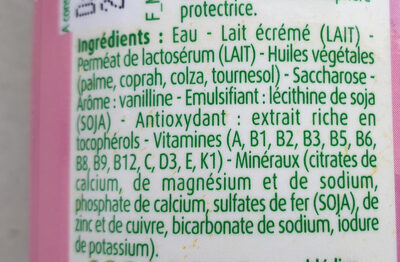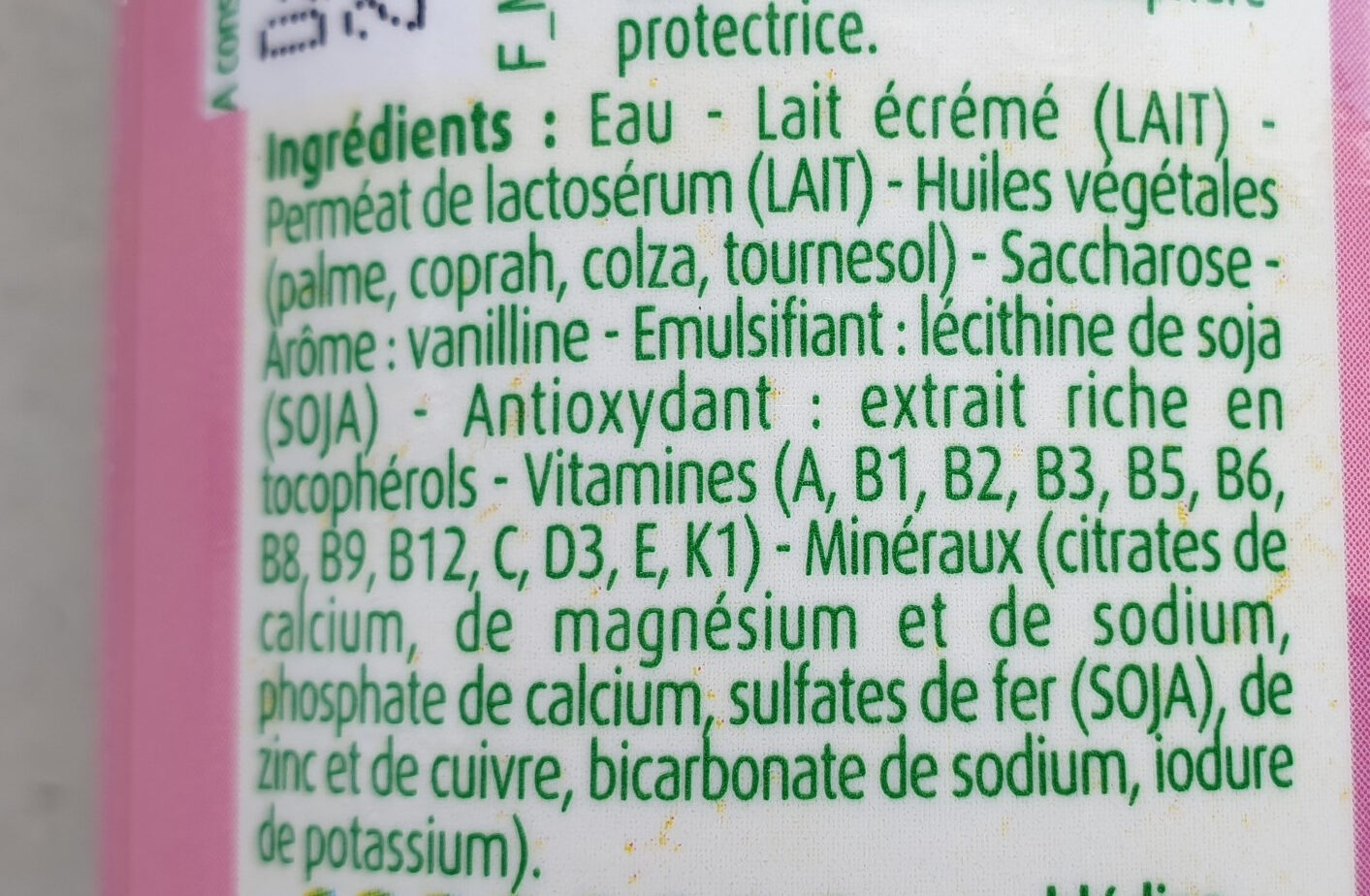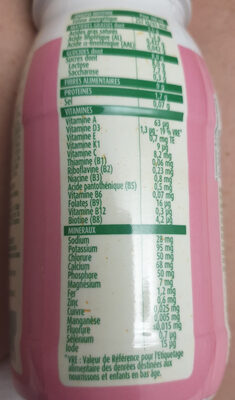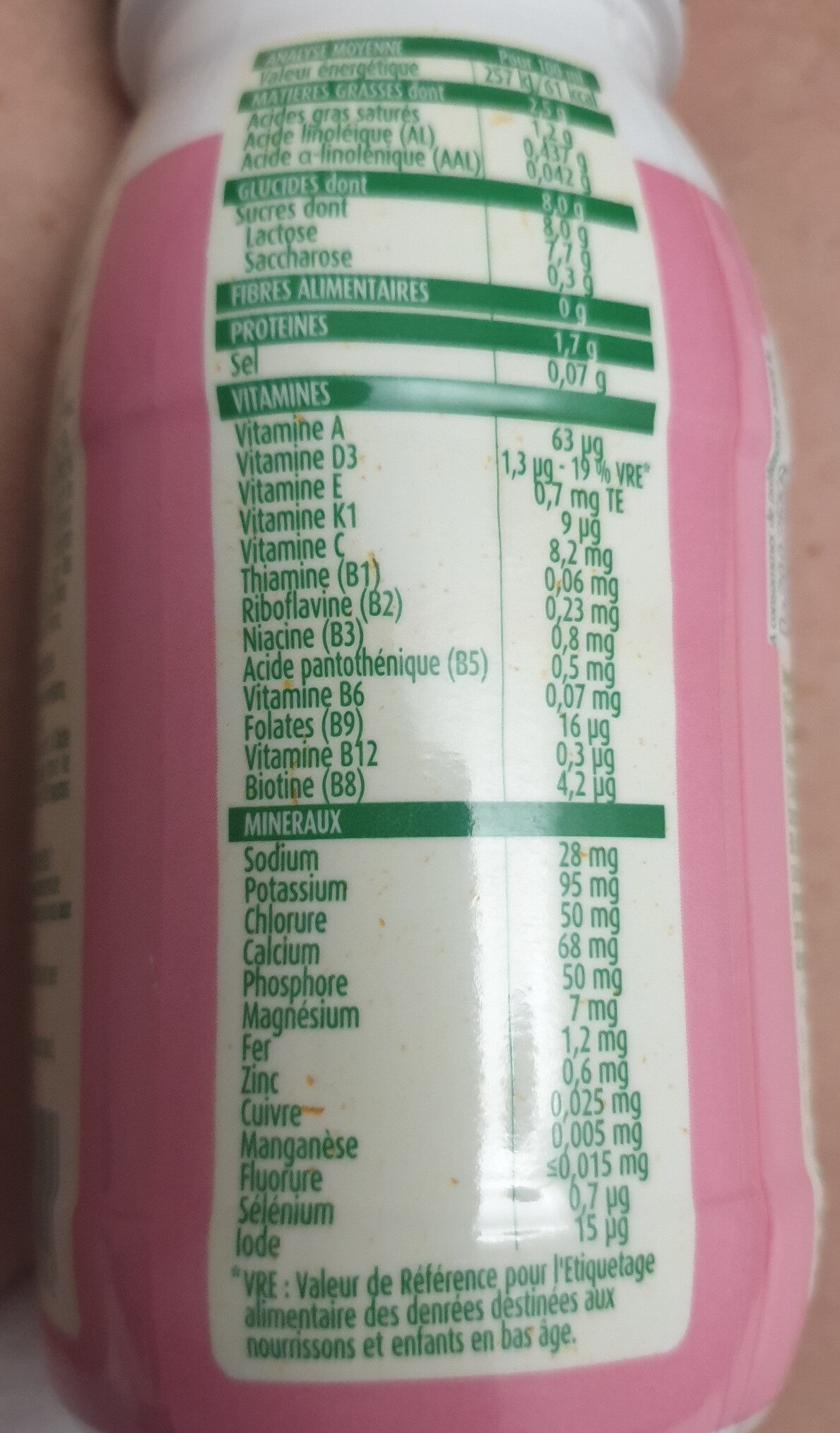Aidez-nous à faire de la transparence alimentaire la norme !
En tant qu'organisation à but non lucratif, nous dépendons de vos dons pour continuer à informer les consommateurs du monde entier sur ce qu'ils mangent.
La révolution alimentaire commence avec vous !
BLEDILAIT Croissance mini 3 250ml De 1 à 3 ans - Danone - 0.25 kg
BLEDILAIT Croissance mini 3 250ml De 1 à 3 ans - Danone - 0.25 kg
La page de ce produit n'est pas complète. Vous pouvez aider à la compléter en l'éditant et en ajoutant plus de données à partir des photos que nous avons, ou en prenant plus de photos à l'aide de l'application pour Android ou iPhone / iPad. Merci!
×
Certaines informations de ce produit ont été fournies directement par son fabricant BLEDINA .
Code-barres: 3041091478092 (EAN / EAN-13)
Dénomination générique : Aliment lacté liquide destiné aux enfants en bas âge.
Quantité : 0.25 kg
Conditionnement : Plastique
Marques : Danone, Bledina, Bledilait
Catégories : Aliments pour bébé, Laits pour bébé
Labels, certifications, récompenses : Bledilait
Pays de vente : France
Correspondance avec vos préférences
Santé
Ingrédients
-
39 ingrédients
Eau - Lait écrémé (LAIT) - Perméat de lactosérum (LAIT) - Huiles végétales (palme, coprah, colza, tournesol) - Saccharose - Arôme : vanilline - Emulsifiant : lécithine de soja (SOJA) - Antioxydant : extrait riche en tocophérols - Vitamines (A, B1, B2, B3, B5, B6, B8, B9, B12, C, D3, E, K1) - Minéraux (citrates de calcium, de magnésium et de sodium, phosphate de calcium, sulfates de fer (SOJA), de zinc et de cuivre, bicarbonate de sodium, iodure de potassium)Allergènes : Lait, Soja
Transformation des aliments
-
Aliments ultra-transformés
Éléments qui indiquent que le produit est dans le groupe 4 - Produits alimentaires et boissons ultra-transformés :
- Additif : E322 - Lécithines
- Ingrédient : Émulsifiant
- Ingrédient : Arôme
- Ingrédient : Petit-lait
Les produits alimentaires sont classés en 4 groupes selon leur degré de transformation :
- Aliments non transformés ou minimalement transformés
- Ingrédients culinaires transformés
- Aliments transformés
- Aliments ultra-transformés
La détermination du groupe est basée sur la catégorie du produit et sur les ingrédients qu'il contient.
Additifs
-
E322 - Lécithines
Les lécithines font partis des additifs les plus utilisés dans l'industrie agroalimentaire, puisqu'ils sont présents dans 17 % des produits alimentaires selon l'Anses. Ils ne présentent pas de risques connus pour la santé.
-
E322i - Lécithine
Les lécithines font partis des additifs les plus utilisés dans l'industrie agroalimentaire, puisqu'ils sont présents dans 17 % des produits alimentaires selon l'Anses. Ils ne présentent pas de risques connus pour la santé.
Analyse des ingrédients
-
Huile de palme
Ingrédients contenant de l'huile de palme : Palme
-
Non végétalien
Ingrédients non végétaliens : Lait écrémé, Perméat de petit lait
-
Caractère végétarien inconnu
Ingrédients non reconnus : Vanilline, Thiamine, Acide folique, Cobalamine, Tocophérol, Sulfate de fer, Zinc, Cuivre
-
Détail de l'analyse des ingrédients
: Eau, Lait écrémé, Perméat de lactosérum, Huiles végétales (palme, coprah, colza, tournesol), Saccharose, Arôme (vanilline), Emulsifiant (lécithine de soja), Antioxydant (extrait riche en tocophérols), vitamines, vitamine A, vitamine B1, vitamine B2, vitamine B3, vitamine B5, vitamine B6, vitamine B8, vitamine B9, vitamine B12, vitamine C, vitamine D3, vitamine E, vitamine K1, Minéraux (citrates de calcium, citrates de magnésium, citrates de sodium, phosphate de calcium, sulfates de fer, de zinc, de cuivre, bicarbonate de sodium, iodure de potassium)- Eau -> en:water - vegan: yes - vegetarian: yes - ciqual_food_code: 18066 - percent_min: 4.34782608695652 - percent_max: 100
- Lait écrémé -> en:skimmed-milk - vegan: no - vegetarian: yes - ciqual_proxy_food_code: 19051 - percent_min: 0 - percent_max: 50
- Perméat de lactosérum -> en:whey-permeate - vegan: no - vegetarian: maybe - percent_min: 0 - percent_max: 33.3333333333333
- Huiles végétales -> en:vegetable-oil - vegan: yes - vegetarian: yes - from_palm_oil: maybe - percent_min: 0 - percent_max: 25
- palme -> en:palm - vegan: yes - vegetarian: yes - from_palm_oil: yes - ciqual_food_code: 16129 - percent_min: 0 - percent_max: 25
- coprah -> en:coconut-oil - vegan: yes - vegetarian: yes - from_palm_oil: no - ciqual_food_code: 16040 - percent_min: 0 - percent_max: 12.5
- colza -> en:colza-oil - vegan: yes - vegetarian: yes - from_palm_oil: no - ciqual_food_code: 17130 - percent_min: 0 - percent_max: 8.33333333333333
- tournesol -> en:sunflower - vegan: yes - vegetarian: yes - percent_min: 0 - percent_max: 6.25
- Saccharose -> en:sucrose - vegan: yes - vegetarian: yes - ciqual_proxy_food_code: 31016 - percent_min: 0 - percent_max: 8
- Arôme -> en:flavouring - vegan: maybe - vegetarian: maybe - percent_min: 0 - percent_max: 5
- vanilline -> en:vanillin - percent_min: 0 - percent_max: 5
- Emulsifiant -> en:emulsifier - percent_min: 0 - percent_max: 5
- lécithine de soja -> en:soya-lecithin - vegan: yes - vegetarian: yes - ciqual_food_code: 42200 - percent_min: 0 - percent_max: 5
- Antioxydant -> en:antioxidant - percent_min: 0 - percent_max: 5
- extrait riche en tocophérols -> en:e306 - vegan: yes - vegetarian: yes - percent_min: 0 - percent_max: 5
- vitamines -> en:vitamins - vegan: yes - vegetarian: yes - percent_min: 0 - percent_max: 5
- vitamine A -> en:vitamin-a - vegan: yes - vegetarian: yes - percent_min: 0 - percent_max: 5
- vitamine B1 -> en:thiamin - percent_min: 0 - percent_max: 5
- vitamine B2 -> en:e101 - vegan: maybe - vegetarian: yes - percent_min: 0 - percent_max: 5
- vitamine B3 -> en:e375 - vegan: maybe - vegetarian: maybe - percent_min: 0 - percent_max: 5
- vitamine B5 -> en:pantothenic-acid - vegan: yes - vegetarian: yes - percent_min: 0 - percent_max: 5
- vitamine B6 -> en:vitamin-b6 - vegan: yes - vegetarian: yes - percent_min: 0 - percent_max: 5
- vitamine B8 -> en:vitamin-b8 - vegan: yes - vegetarian: yes - percent_min: 0 - percent_max: 5
- vitamine B9 -> en:folic-acid - percent_min: 0 - percent_max: 5
- vitamine B12 -> en:vitamin-b12 - percent_min: 0 - percent_max: 5
- vitamine C -> en:e300 - vegan: yes - vegetarian: yes - percent_min: 0 - percent_max: 5
- vitamine D3 -> en:cholecalciferol - vegan: maybe - vegetarian: maybe - percent_min: 0 - percent_max: 5
- vitamine E -> en:vitamin-e - percent_min: 0 - percent_max: 4.76190476190476
- vitamine K1 -> en:phylloquinone - vegan: yes - vegetarian: yes - percent_min: 0 - percent_max: 4.54545454545455
- Minéraux -> en:minerals - percent_min: 0 - percent_max: 4.34782608695652
- citrates de calcium -> en:e333 - vegan: yes - vegetarian: yes - percent_min: 0 - percent_max: 4.34782608695652
- citrates de magnésium -> en:e345 - vegan: yes - vegetarian: yes - percent_min: 0 - percent_max: 2.17391304347826
- citrates de sodium -> en:e331 - vegan: yes - vegetarian: yes - percent_min: 0 - percent_max: 1.44927536231884
- phosphate de calcium -> en:e341 - vegan: yes - vegetarian: yes - percent_min: 0 - percent_max: 1.08695652173913
- sulfates de fer -> en:ferrous-sulfate - percent_min: 0 - percent_max: 0.869565217391304
- de zinc -> en:zinc - percent_min: 0 - percent_max: 0.72463768115942
- de cuivre -> en:copper - percent_min: 0 - percent_max: 0.62111801242236
- bicarbonate de sodium -> en:e500ii - vegan: yes - vegetarian: yes - percent_min: 0 - percent_max: 0.543478260869565
- iodure de potassium -> en:potassium-iodide - vegan: yes - vegetarian: yes - ciqual_food_code: 11058 - percent_min: 0 - percent_max: 0.07
Nutrition
-
Nutri-Score non applicable
Non applicable pour la catégorie : Aliments pour bébé
⚠ ️Nutri-Score ne s'applique pas à cette catégorie de produits.Pourriez-vous ajouter les informations nécessaires pour calculer le Nutri-Score ?
-
Tableau nutritionnel
Tableau nutritionnel Tel que vendu
pour 100 g / 100 mlTel que vendu
par portion (250ml)Comparé à: Laits pour bébé Énergie 257 kj
(61 kcal)642 kj
(152 kcal)-74 % Matières grasses 2,5 g 6,25 g -77 % Acides gras saturés 1,2 g 3 g -65 % Acide alpha-linolénique 0,042 g 0,105 g -85 % Acide linoléique 0,437 g 1,09 g -78 % Glucides 8 g 20 g -71 % Sucres 8 g 20 g -57 % Saccharose 0,3 g 0,75 g Lactose 7,7 g 19,2 g -74 % Fibres alimentaires 0 g 0 g -100 % Protéines 1,7 g 4,25 g -66 % Sel 0,07 g 0,175 g -61 % Vitamine A (rétinol) 63 µg 158 µg -75 % Vitamine D 1 µg 2,5 µg -82 % Vitamine E (tocophérol) 0,7 mg 1,75 mg -85 % Vitamine K 9 µg 22,5 µg -56 % Vitamine C (acide ascorbique) 8,2 mg 20,5 mg -80 % Vitamine B1 (Thiamine) 0,06 mg 0,15 mg -98 % Vitamine B2 (Riboflavine) 0,23 mg 0,575 mg -97 % Vitamine B3/PP (Niacine) 0,8 mg 2 mg -92 % Vitamine B6 (Pyridoxine) 0,07 mg 0,175 mg -98 % Vitamine B9 (Acide folique) 16 µg 40 µg -75 % Folates (folates totaux) 16 µg 40 µg Vitamine B12 (cobalamine) 0,3 µg 0,75 µg -60 % Biotine (Vitamine B8 ou B7 ou H) 4,2 µg 10,5 µg -46 % Vitamine B5 (Acide pantothénique) 0,5 mg 1,25 mg -75 % Potassium 95 mg 237 mg -69 % Chlorure 50 mg 125 mg -76 % Calcium 68 mg 170 mg -74 % Phosphore 50 mg 125 mg -69 % Fer 1,2 mg 3 mg -64 % Magnésium 7 mg 17,5 mg -73 % Zinc 0,6 mg 1,5 mg -74 % Cuivre 0,025 mg 0,062 mg -99 % Manganèse 0,005 mg 0,012 mg -100 % Fluorure 0,015 mg 0,038 mg -100 % Sélénium 0,7 µg 1,75 µg -93 % Iode 15 µg 37,5 µg -70 % Fruits‚ légumes‚ noix et huiles de colza‚ noix et olive (estimation par analyse de la liste des ingrédients) 0,747 % 0,747 %
Environnement
-
Eco-Score B - Faible impact environnemental
L'Eco-Score est un score expérimental qui synthétise les impacts environnementaux des produits alimentaires.→ La formule de l'Eco-Score est susceptible d'évoluer car elle est régulièrement améliorée pour la rendre plus précise.Analyse du cycle de vie
-
Impact moyen des produits de la même catégorie : A (Score: 94/100)
Catégorie : Lait 1er âge, prêt à consommer (préparation pour nourrissons)
Catégorie : Lait 1er âge, prêt à consommer (préparation pour nourrissons)
- Score environnemental PEF : 0.15 (plus le score est bas, plus l'impact est faible)
- dont impact sur le changement climatique : 1.53 kg CO2 eq/kg de produit
Etape Impact Agriculture
71.0 %Transformation
1.0 %Emballage
9.6 %Transport
10.7 %Distribution
6.0 %Consommation
1.7 %
Bonus et malus
-
Informations manquantes sur les origines des ingrédients
Malus : -5
⚠ ️ Les origines des ingrédients de ce produit ne sont pas renseignées.
Si elles sont indiquées sur l'emballage, vous pouvez modifier la fiche produit et les ajouter.
Si vous êtes le fabricant de ce produit, vous pouvez nous transmettre les informations avec notre plateforme gratuite pour les producteurs.
-
Ingrédients qui menacent des espèces
Malus : -10
Contient de l'huile de palme
Les forêts tropicales d'Asie, d'Afrique et d'Amérique latine sont détruites pour créer et étendre les plantations de palmiers à huile. La déforestation contribue au changement climatique et met en danger des espèces telles que l'orang-outan, l'éléphant pygmée et le rhinocéros de Sumatra.
-
Emballage à impact moyen
Malus : -10
Forme Matière Recyclage Impact Inconnu Plastique élevé ⚠ ️ Les informations sur l'emballage de ce produit ne sont pas suffisamment précises (formes et matériaux exacts de tous les composants de l'emballage).⚠ ️ Pour un calcul plus précis de l'Eco-Score, vous pouvez modifier la fiche produit et les ajouter.
Si vous êtes le fabricant de ce produit, vous pouvez nous transmettre les informations avec notre plateforme gratuite pour les producteurs.
Eco-Score pour ce produit
-
Impact pour ce produit: B (Score: 69/100)
Produit : BLEDILAIT Croissance mini 3 250ml De 1 à 3 ans - Danone - 0.25 kg
Score d'analyse du cycle de vie : 94
Somme des bonus et malus : -25
Score final : 69/100
-
Empreinte carbone
-
Équivaut à parcourir 0.8 km dans une voiture à essence
153 g de CO² pour 100g de produit
Le chiffre d'émission carbone est issu de la base de données Agribalyse de l'ADEME, pour la catégorie : Lait 1er âge, prêt à consommer (préparation pour nourrissons) (Source : Base de données ADEME Agribalyse)
Etape Impact Agriculture
73.4 %Transformation
0.7 %Emballage
9.7 %Transport
13.4 %Distribution
2.3 %Consommation
0.4 %
Emballage
-
Emballage à impact moyen
-
Elements d'emballage
(Plastique)
-
Matériaux d'emballage
Matière % Poids de l'emballage Poids de l'emballage pour 100 g de produit Plastique
-
Transport
-
Origines des ingrédients
Informations manquantes sur les origines des ingrédients
⚠ ️ Les origines des ingrédients de ce produit ne sont pas renseignées.
Si elles sont indiquées sur l'emballage, vous pouvez modifier la fiche produit et les ajouter.
Si vous êtes le fabricant de ce produit, vous pouvez nous transmettre les informations avec notre plateforme gratuite pour les producteurs.Ajouter les origines des ingrédients pour ce produit Ajouter les origines des ingrédients pour ce produit
Espèces menacées
-
Contient de l'huile de palme
Stimule la déforestation et menace des espèces telles que l'orang-outan
Les forêts tropicales d'Asie, d'Afrique et d'Amérique latine sont détruites pour créer et étendre les plantations de palmiers à huile. La déforestation contribue au changement climatique et met en danger des espèces telles que l'orang-outan, l'éléphant pygmée et le rhinocéros de Sumatra.
Autres informations
Préparation : Il est important de bien respecter les instructions suivantes afin d'éviter des risques pour la santé de votre bébé : lavez-vous toujours les mains ainsi que votre plan de travail avant de préparer le biberon. Préparez le biberon juste avant le repas. Une fois préparé, il est recommandé de consommer le biberon dans la demi-heure. Si votre bébé n'a pas tout bu, jetez le reste du biberon sans hésiter.
Conditions de conservation :
Avant ouverture, conserver à température ambiante dans un endroit propre et sec.
Après ouverture, conserver refermé, maximum 48 heures au réfrigérateur.
Service consommateur : Service consommateur Blédina, 81 rue de Sans Souci 69576 LIMONEST Cedex France
Signaler un problème
-
Informations incomplètes ou incorrectes ?
Catégorie, labels, ingrédients, allergènes, informations nutritionnelles, photos etc.
Si les informations ne correspondent pas aux informations présentes sur l'emballage, vous pouvez les compléter ou de les corriger. Merci ! Open Food Facts est une base de données collaborative, et chaque contribution est utile à tous.
-

Faire un signalement sur SignalConso
Etiquetage non conforme, vente d'un produit périmé, présence d'un corps étranger, etc.
Vous avez rencontré un problème avec ce produit : étiquetage non conforme, produit périmé encore en vente, présence d'un corps étranger, etc. ?
Faites un signalement à l'entreprise et à la répression des fraudes sur SignalConso, un outil de la Direction générale de la concurrence, de la consommation et de la répression des fraudes (DGCCRF).
Sources de données
Le fabricant BLEDINA utilise CodeOnline Food pour transmettre automatiquement des données et des photos pour ses produits.
Les fabricants peuvent utiliser la plateforme gratuite pour les producteurs d'Open Food Facts pour accéder à ces données et les compléter, et obtenir des rapports, analyses et pistes d'améliorations des produits (par exemple meilleur Nutri-Score).
Produit ajouté le par kiliweb
Dernière modification de la page produit le par inf.
Fiche produit également modifiée par j2m9544, openfoodfacts-contributors, org-bledina, packbot, roboto-app, yuka.ZktjRE5wMEN2dWt6dHRzd3BVejYvZlVvKzZTcVUyR0hBTzBWSVE9PQ.









